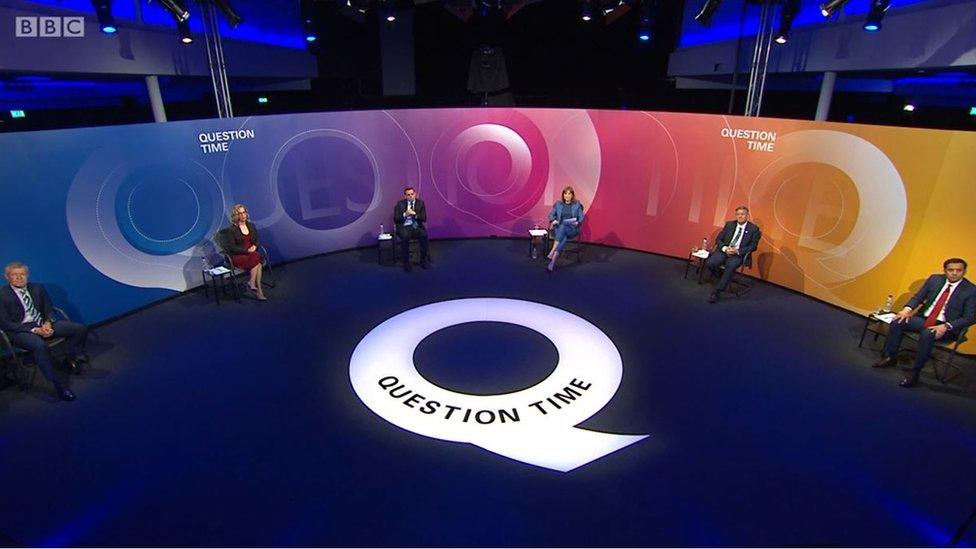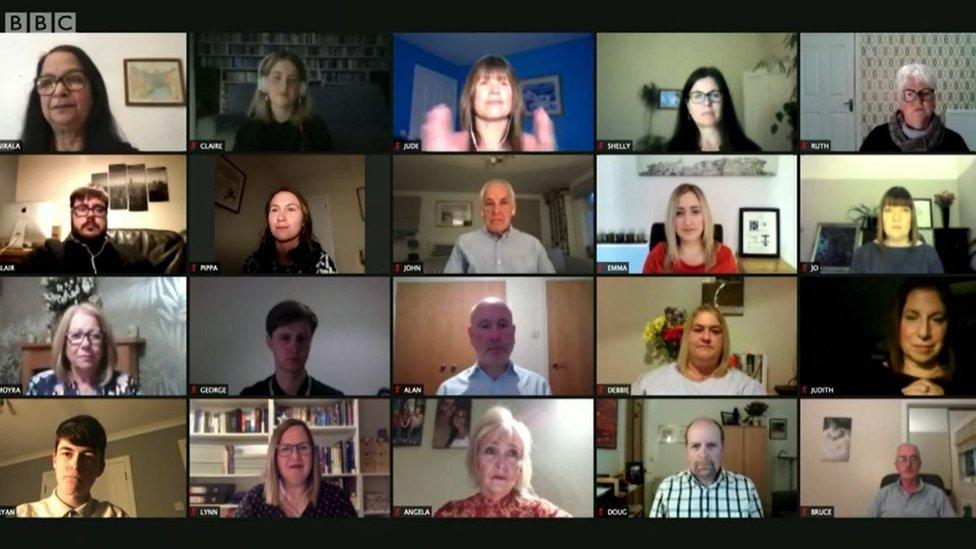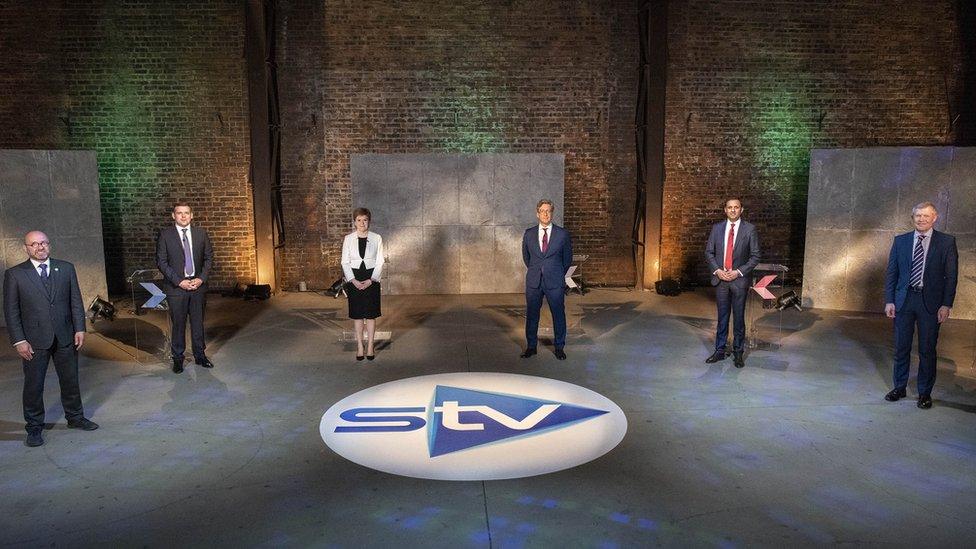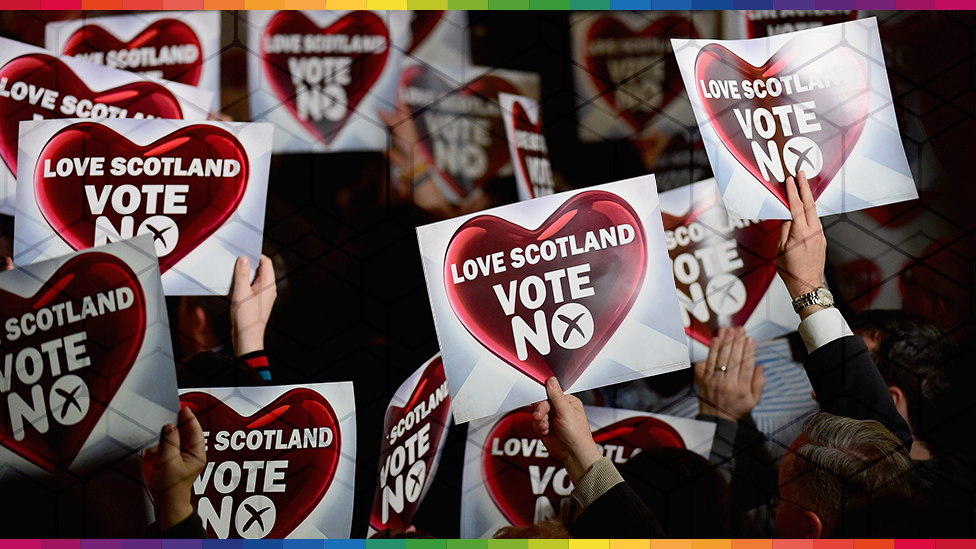Scottish election 2021: Parties grilled over detail of Covid recovery plans
- Published

Senior party figures took part in a Question Time election special
Senior politicians from Scotland's main parties have been grilled over the detail of their Covid recovery plans.
In a BBC Question Time election special, the SNP and Conservatives faced questions on NHS spending while the Lib Dems were pressed on costings.
The Greens heard concerns for oil and gas workers' job security and Labour was pressed on its long term commitments.
It comes ahead of the Holyrood election on 6 May.
The televised debate saw Scottish Lib Dem leader Willie Rennie, Scottish Greens co-leader Lorna Slater, Scottish Conservative leader Douglas Ross, SNP deputy leader Keith Brown and Scottish Labour leader Anas Sarwar take questions from a virtual audience.
It is the first time all five main parties have debated issues following the publication of their manifestos.

SIGN UP FOR SCOTLAND ALERTS: Get extra updates on BBC election coverage

When asked if the NHS in Scotland was ready to tackle the pandemic aftermath, Mr Brown said the SNP would allocate further funding to the health service if it was forthcoming from the UK government.
But host Fiona Bruce pointed out that a recent report from the Institute of Fiscal Studies (IFS) suggested that the Scottish government's £2.5bn increase to NHS spending was less than the UK government promised to NHS England.
Mr Brown said the figures had been "disputed by experts" and reiterated the party's manifesto pledge to have 10% of the NHS budget go into mental health in five years.

A virtual audience shared various concerns about the route to recovery from the pandemic
Meanwhile, Mr Ross was asked why his party apparently "u-turned" on their position on a 4% pay rise for NHS staff which was announced by the Scottish government in March.
The Conservatives initially said they would make a decision on the matter following the outcome of an independent report before later agreeing with the figure, which is currently subject of consultations with NHS staff.
Mr Ross said: "It was never a u-turn, I absolutely support the 4%. It will be after the election that we understand the outcome of the ballot on that."
He added his party's spending plans for the NHS were "the most generous in this election".
One audience member who works in oil and gas sector asked the parties about their plans to invest in the industry and support workers during a transition away from fossil fuels.
Ms Slater, for the Scottish Greens, said she "absolutely understood and shared" concerns for the sector, pointing to the manufacturing of renewables such as tidal turbines.
She said: "This is how we manage the decline of oil and gas to tackle the climate emergency and meet legal targets. That does not mean we have to inflict hardship.
The co-leader added her party's plans included a jobs guarantee for oil and gas workers transferring into renewable industries and there was a "huge amount of opportunity" in Scotland.

SCOTLAND'S ELECTION: THE BASICS
What's happening? On 6 May, people across Scotland will vote to elect 129 Members of the Scottish Parliament (MSPs). The party that wins the most seats will form the government. Find out more here.
What powers do they have? MSPs pass laws on aspects of life in Scotland such as health, education and transport - and have some powers over tax and welfare benefits.

When asked by the audience to explain the basis of his party's spending pledges, Mr Rennie said that like the SNP, the Lib Dems had based their plans on a "central estimate" of the Scottish government's medium term financial strategy.
However, when pressed by Ms Bruce on why the Lib Dems had not widely shared the costing of their manifesto, Mr Rennie insisted the promises could be delivered.
He said: "We have costed the manifesto, we can make the costing available - we discussed it with the IFS yesterday. Believe me it's well affordable, we're not going to over promise."
On the same question, Ms Bruce pointed out to Mr Sarwar that his manifesto only detailed spending promises for the first year.
Mr Sarwar said that Labour had "deliberately" given a recovery plan rather than a party manifesto.
He said: "There are billions of pounds of unallocated recurring and non-recurring spend available to the Scottish government after this election. I want to start spending that straight away."
In terms of the NHS recovery, Mr Sarwar later said his party had plans for both the short and long term - such as building rapid diagnosis centres while using temporary facilities in the interim.

POLICIES: Who should I vote for?
CANDIDATES: Who can I vote for in my area?
PODLITICAL: Updates from the campaign


Do you have a question about the Scottish Parliament election? Use the form below to send us your questions and we could be in touch.
In some cases your question will be published, displaying your name, and location as you provide it, unless you state otherwise. Your contact details will never be published. Please ensure you have read the terms and conditions.
If you are reading this page on the BBC News app, you will need to visit the mobile version of the BBC website to submit your question on this topic.

- Published13 April 2021

- Published20 April 2021

- Published22 April 2021

- Published22 April 2021
